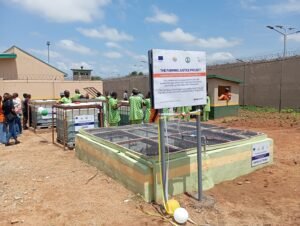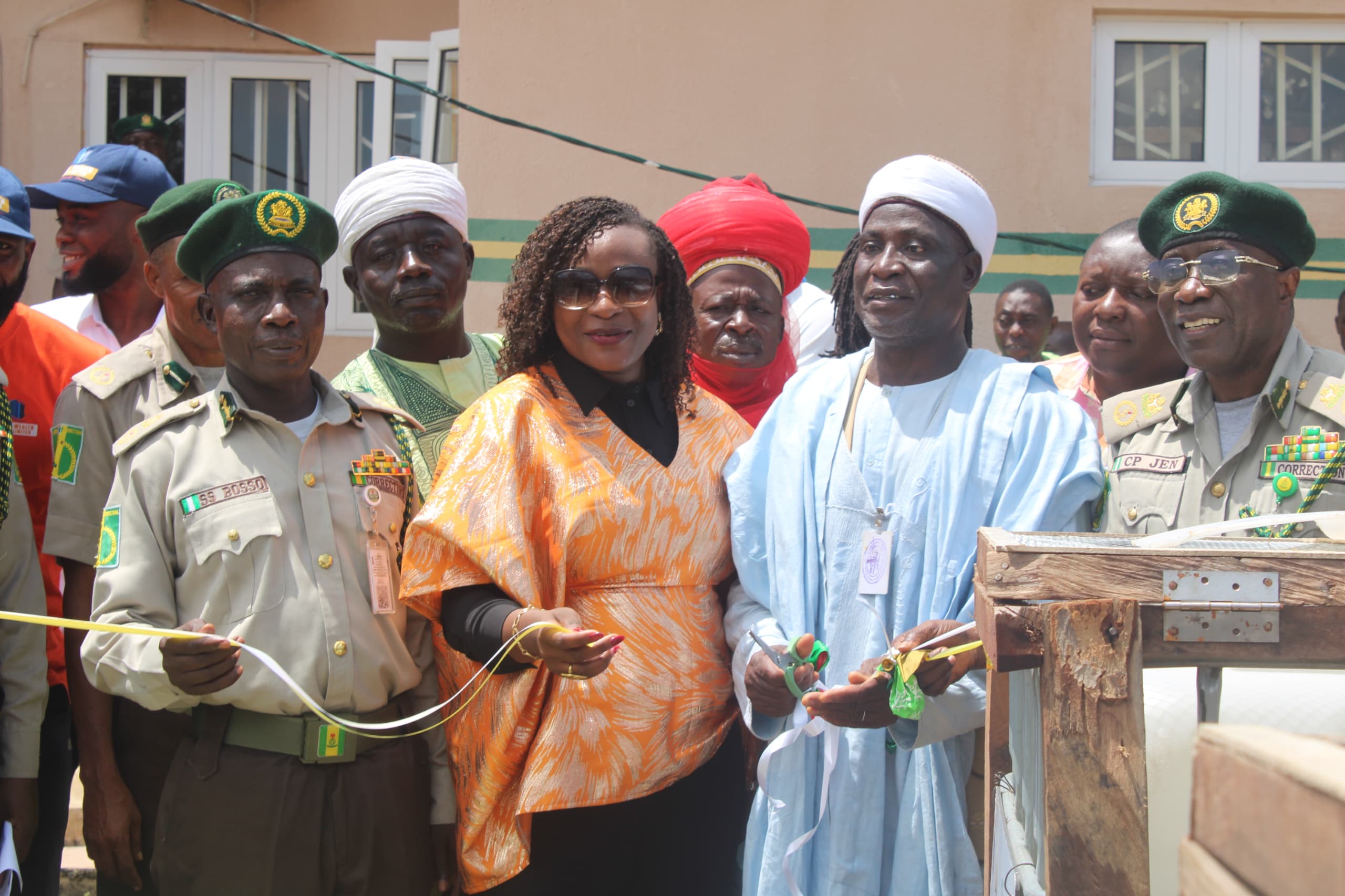By Oluwasegun Sotonwa/Ibironke Ariyo
An NGO, The Hope Behind Bars Africa (HBBA), has launched the Farming Justice Project aimed at promoting reformation, rehabilitation, and reintegration of inmates at the Kuje Custodial Centre, Abuja.
Speaking at the inauguration ceremony on Tuesday in Abuja, the Executive Director, HBBA, Mrs Funke Adeoye, said that the project was conceived to bridge the gap between the new correctional mandate and its practical implementation.

The Farming Justice Project
The News Agency of Nigeria (NAN) reports that the initiative was funded by the European Union (EU) through International IDEA that brings together agro-innovation, compassion and commitment to justice reform in Nigeria.
Adeoye said that the initiative, under Rule of Law and Anti-Corruption (RoLAC), in partnership with HBBA and Nigeria Correctional Service (NCoS), seeks to empower inmates through agricultural training and practical food production within correctional facilities.
She explained that the organisation’s seven-year collaboration with the NCoS revealed the need for more support to make custodial centres truly correctional.
“With the change in nomenclature from ‘prison’ to ‘correctional service’, there was a need to ensure that our custodial centres reflect that change through genuine rehabilitation and empowerment,” she said.
Adeoye emphasised that the project aligned with HBBA’s goal of promoting a restorative justice system that gives inmates the opportunity to acquire life skills, contribute to food production, and reduce reoffending after release.
She said that the experimental farm established at the Kuje facility was part of a broader initiative that included a Dukpa Farm Centre.
This, she said, was where more than 80 inmates were learning modern agricultural practices in okra, watermelon, and tomato production.
“Some of our harvested okra has already been consumed by inmates, showing real progress in tackling food shortages in custodial centres,” she said.
Adeoye added that in Lagos, HBBA had also worked with female inmates on the cultivation of okra, bell pepper, and tomato, while plans were underway to extend the project to more facilities across the country.
“The project aims to reduce recidivism by ensuring that inmates have viable means of livelihood after serving their sentences, while also contributing to the fight against food insecurity within correctional facilities.
“We are calling on all partners and well-meaning Nigerians to support the NCoS in ensuring effective rehabilitation and reintegration of inmates,” she said.
Adeoye commended the Comptroller General, NCoS, Mr Sylvester Nwakuche, for his openness and commitment to fostering public-private partnerships that could enhance agricultural development within correctional facilities.
She also appreciated the European Union and International IDEA for funding the initiative and supporting efforts to make Nigeria’s justice system restorative rather than retributive.
On the issue of awaiting-trial inmates, Adeoye stressed the importance of community corrections and reintegration, noting that most inmates would eventually return to society.
“Out of over 80,000 inmates nationwide, only about 3,600 are on death row. This means that a large number of inmates will return to our communities.
“Therefore, it is our responsibility to ensure they come out better prepared for productive living.
“The Farming Justice Project marked the beginning of a new phase of correctional reform where rehabilitation and productivity go hand-in-hand.
“When we reform justice-impacted individuals and equip them with practical skills, we build a safer, more inclusive society for everyone,” she said.
In his welcome address, Controller of Corrections, NCoS, FCT Command, Christopher Jen, expressed optimism for a safer and better Nigeria through the empowerment and rehabilitation of inmates with life-changing skills.
Jen said that the initiative was a step towards building a peaceful society where former inmates could become productive citizens, thereby reducing fear and insecurity within communities.
“My desire is to see a better Nigeria tomorrow where everyone will live without fear or anxiety. The enthusiasm and willingness of inmates to learn skills today give me confidence that such a future is possible,” he said.
Jen commended the passion displayed by inmates participating in various vocational programmes at the facility, describing Kuje Custodial Centre as a “centre of excellence” in skill acquisition.
He listed several training programmes ongoing at the centre, including barbing, cap making, embroidery, computer repair, electrical work, shoemaking, tie and dye, artwork, fishery, soap making, carpentry, plumbing, and building construction.
In his goodwill message, the representative of the international IDEA, Mr Joseph Odeh, reaffirmed the organisation’s commitment to promoting rehabilitation and justice reform through agricultural empowerment for inmates in Nigeria.
Odeh said that the organisation also recognised the role of civil society organisations and private sector actors in advancing rehabilitation, noting that justice reform requires collective responsibility.
“Justice reform is not the responsibility of one institution alone. It is a shared mission that requires the active participation of all sectors of society.
“International IDEA urges all stakeholders to view rehabilitation as a right, not a privilege, and reintegration as a national goal that must be actively pursued.
“Let this day mark the beginning of a new chapter in our justice system, one that prioritises human development, community reintegration, and sustainable transformation,” he said.
Highlight of the event were guided tour of the Kuje Custodial facilities, unveiling of the Farming Justice Project, and visit to some of the skill acquisition centres in the Kuje Centre. (NAN)(www.nannews.ng)
Edited by Yakubu Uba











